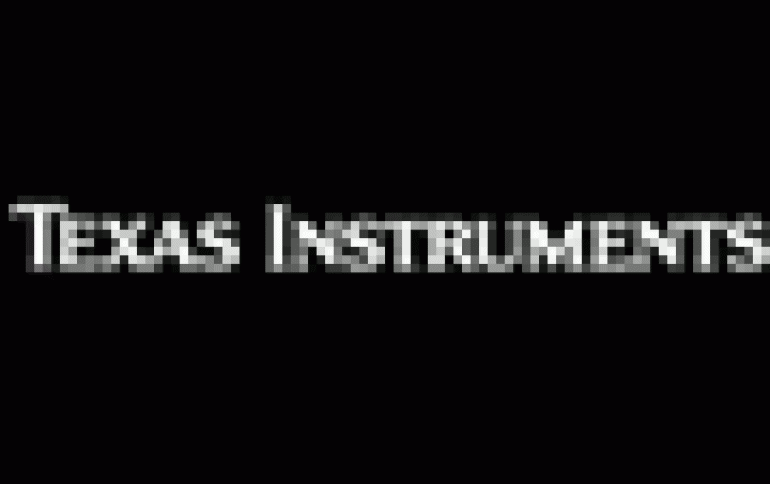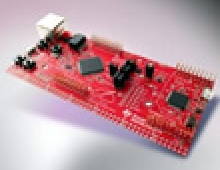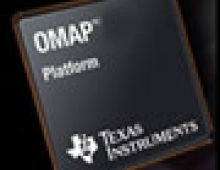
New Chip Enables Existing AVRs to Support HD DVD and Blu-ray Surround Sound
Texas Instruments announced on Thusday enhancements to its Aureus generation of audio digital signal processors, offering a higher speed memory interface for the DA710 and DA708 devices, as well as higher CPU performance.
As home theater systems transition to blue laser technology, TI's Aureus processors support Dolby Digital Compatible Output technology, which enables next-generation optical disc (HD DVD and Blu-ray) players to deliver a 640kbps Dolby Digital encoded surround sound signal and compatible playback through any existing Dolby Digital equipped audio/video receiver (AVR) with a digital audio input (S/PDIF or optical).
TI's Aureus generation of processors targets a wide range of home theater and automotive products which require multi-channel decoding and high-speed encoding, including: AVRs, HD televisions, home media servers, automotive jukeboxes, MP3 player docking stations and emerging HD DVD and Blu-ray Disc equipment.
The Aureus generation of DSPs, including the upgraded DA710 and DA708, can be used in various applications, such as audio mixing and re-encoding in HD DVD or Blu-ray Disc players. TI supports this new market with production- ready multi-channel audio encoders, such as Dolby Digital Compatible Output technology, offering a simple way for consumer electronics manufacturers to offer playback of a Dolby Digital surround sound signal through the multiple Dolby Digital equipped legacy audio-video receivers on the market.
Using a DA7xx DSP, the mixing and re-encoding functions can be implemented in a single device. The mixing function is necessary for next generation optical disc players supporting dual audio streams. Mixing a secondary audio stream with a primary audio stream, such as a movie soundtrack enables new applications, including downloading a stream of secondary director's commentary or commercial content over a broadband Internet connection. A DA7xx DSP is capable of mixing primary and secondary audio streams, even if they have different sample rates, as well as a third audio stream for controls or "button sounds." Because it can handle several audio streams, the DA7xx DSP can accommodate audio enhancements, such as virtualization or surround sound technology for headphones.
In addition to a single-chip solution for mixing and re-encoding, TI offers a complete audio processing solution for next-generation optical disc players and future support for Dolby TrueHD, Dolby Digital Plus and DTS-HD.
Many audio algorithms and advanced processing features are memory- intensive and therefore require access to external memory. For example, effects such as reverb or virtualization use long delay buffers, which exceed the capacity of internal memory resources. The new enhanced devices increase SDRAM access bandwidth up to 133 MHz with processor speeds of 300 MHz and 275 MHz for the DA710 and 266 MHz for the DA708. Faster external memory access decreases processing latency of delay buffers, improving overall codec performance and audio quality.
Increased memory interface bandwidth also improves performance for algorithm and application updates. When the software for an existing product is upgraded, such as to support a new algorithm or new functionality, the new code and data cannot be stored in the DSP's on-chip ROM. In most cases, it is stored in external memory. Increasing memory bandwidth drastically reduces the impact that this external code and data have on algorithm performance.
The new DA710 devices with 133 MHz memory interface are available now in an industry standard GDH package. The 300 MHz DA710 costs $21.63 each, while the 275 MHz DA710 costs $16.05 each, both in quantities of 10,000 or more. The 266 MHz DA708 with a 133 MHz memory interface is available in an RFP package and costs $13.52 each in quantities of 10,000 or more.
The DA710 and DA708 also are available for automotive applications that are Q100 qualified and rated for operation in extended temperatures. The DA710 for automotive applications provides 275 MHz, while the DA708 offers 250 MHz. Both devices have the enhanced 133 MHz SDRAM interface.
Dolby Digital Compatible Output is certified and available now. In addition to supporting emerging HD standards, Aureus devices offer a comprehensive array of development tools and codecs, including industry- standard decoders and post-processors from Dolby, DTS, SRS Labs, THX and Microsoft. In addition, TI offers the TI Effects Library, TI Perfect Playback compressed audio enhancer and the framework and I/O software required to build a complete audio system.
TI's Aureus generation of processors targets a wide range of home theater and automotive products which require multi-channel decoding and high-speed encoding, including: AVRs, HD televisions, home media servers, automotive jukeboxes, MP3 player docking stations and emerging HD DVD and Blu-ray Disc equipment.
The Aureus generation of DSPs, including the upgraded DA710 and DA708, can be used in various applications, such as audio mixing and re-encoding in HD DVD or Blu-ray Disc players. TI supports this new market with production- ready multi-channel audio encoders, such as Dolby Digital Compatible Output technology, offering a simple way for consumer electronics manufacturers to offer playback of a Dolby Digital surround sound signal through the multiple Dolby Digital equipped legacy audio-video receivers on the market.
Using a DA7xx DSP, the mixing and re-encoding functions can be implemented in a single device. The mixing function is necessary for next generation optical disc players supporting dual audio streams. Mixing a secondary audio stream with a primary audio stream, such as a movie soundtrack enables new applications, including downloading a stream of secondary director's commentary or commercial content over a broadband Internet connection. A DA7xx DSP is capable of mixing primary and secondary audio streams, even if they have different sample rates, as well as a third audio stream for controls or "button sounds." Because it can handle several audio streams, the DA7xx DSP can accommodate audio enhancements, such as virtualization or surround sound technology for headphones.
In addition to a single-chip solution for mixing and re-encoding, TI offers a complete audio processing solution for next-generation optical disc players and future support for Dolby TrueHD, Dolby Digital Plus and DTS-HD.
Many audio algorithms and advanced processing features are memory- intensive and therefore require access to external memory. For example, effects such as reverb or virtualization use long delay buffers, which exceed the capacity of internal memory resources. The new enhanced devices increase SDRAM access bandwidth up to 133 MHz with processor speeds of 300 MHz and 275 MHz for the DA710 and 266 MHz for the DA708. Faster external memory access decreases processing latency of delay buffers, improving overall codec performance and audio quality.
Increased memory interface bandwidth also improves performance for algorithm and application updates. When the software for an existing product is upgraded, such as to support a new algorithm or new functionality, the new code and data cannot be stored in the DSP's on-chip ROM. In most cases, it is stored in external memory. Increasing memory bandwidth drastically reduces the impact that this external code and data have on algorithm performance.
The new DA710 devices with 133 MHz memory interface are available now in an industry standard GDH package. The 300 MHz DA710 costs $21.63 each, while the 275 MHz DA710 costs $16.05 each, both in quantities of 10,000 or more. The 266 MHz DA708 with a 133 MHz memory interface is available in an RFP package and costs $13.52 each in quantities of 10,000 or more.
The DA710 and DA708 also are available for automotive applications that are Q100 qualified and rated for operation in extended temperatures. The DA710 for automotive applications provides 275 MHz, while the DA708 offers 250 MHz. Both devices have the enhanced 133 MHz SDRAM interface.
Dolby Digital Compatible Output is certified and available now. In addition to supporting emerging HD standards, Aureus devices offer a comprehensive array of development tools and codecs, including industry- standard decoders and post-processors from Dolby, DTS, SRS Labs, THX and Microsoft. In addition, TI offers the TI Effects Library, TI Perfect Playback compressed audio enhancer and the framework and I/O software required to build a complete audio system.




















